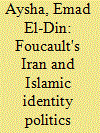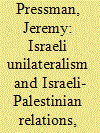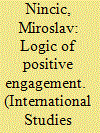|
|
|
Sort Order |
|
|
|
Items / Page
|
|
|
|
|
|
|
| Srl | Item |
| 1 |
ID:
075011


|
|
|
|
|
| Publication |
2006.
|
| Summary/Abstract |
Foucault's writings on the Iranian revolution and the works of the revolutionary Islamist intelligentsia (not the clerics) are of tremendous relevance to social scientists today because they show us a way out of the internal clash of civilizations Islam suffers from. By extension this helps alleviate the confrontation between the civilizations of the West and Islam because culture clash-the fear of cultural imperialism and Westernization-is holding back the forces of modernization in the Muslim world. Iran's revolutionary thinkers, as Foucault demonstrates, were against this standoff. Afary and Anderson's review of the Foucault controversy inadvertently brings this out because the mistakes they make are paradigmatic errors made by the social sciences and many Western (and Eastern) decision-makers; assuming that modernization means secularization means Westernization.
|
|
|
|
|
|
|
|
|
|
|
|
|
|
|
|
| 2 |
ID:
075010


|
|
|
|
|
| Publication |
2006.
|
| Summary/Abstract |
Israeli-Palestinian relations witnessed dramatic changes from 2001-2006. Sharon came to power, the second intifada (uprising) raged, Arafat died, Israel withdrew from Gaza, and Sharon fell ill and out of political life. Israel's embrace of unilateralism led to the Gaza disengagement and the construction of a barrier in the West Bank. Why did Israel embrace unilateralism? Israel's unilateral approach to the Palestinian question resulted from the failure of three other approaches to addressing the conflict: bilateral diplomacy, Greater Israel and settlements, and military suppression. Unilateralism was not inevitable, but Israelis and Palestinians missed opportunities to pursue other pathways. The United States also missed chances to jump-start bilateral diplomacy. The United States role in these years was less consistent and less pro-active than under the first President Bush and President Clinton.
|
|
|
|
|
|
|
|
|
|
|
|
|
|
|
|
| 3 |
ID:
075006


|
|
|
|
|
| Publication |
2006.
|
| Summary/Abstract |
What happens following a war is important to the moral judgments we make concerning warfare, just as the intentions going in and the means used are. There has, however, been inadequate attention paid to considerations of jus post bellum in the just war tradition. This essay seeks to contribute to recent efforts to develop jus post bellum principles by first noting some of the ways that jus ad bellum and jus in bello considerations serve to constrain what can legitimately be done after war. We argue, however, that the constraints grounded in traditional just war theory do not offer sufficient guidance for judging postwar behavior and that principles grounded in the concept of human rights are needed to complete our understanding of what constitutes a just war. A just peace exists when the human rights of those involved in the war, on both sides, are more secure than they were before the war.
|
|
|
|
|
|
|
|
|
|
|
|
|
|
|
|
| 4 |
ID:
075007


|
|
|
|
|
| Publication |
2006.
|
| Summary/Abstract |
This article is intended to offset, partially at least, the lopsided stress placed by international relations scholarship on punitive pressures, at the expense of positive inducements, as tools for bringing renegade regimes into compliance with internationally accepted norms of behavior. I discuss the focus on punishment as a tool of foreign policy and the reasons why this bias has provided disappointing results. Using a parallel theoretical framework, I then discuss the forms that inducements can assume and the circumstances encouraging their success. The hypotheses thus derived are applied to a number of specific policy challenges. The bottom line is that inducements can, at times, produce a direct quid pro quo from the target regime and, occasionally, can modify that regime's basic motivations, so that both punishments and rewards become less necessary. In any case, positive engagement is most effective when regime's position is being challenged from within.
|
|
|
|
|
|
|
|
|
|
|
|
|
|
|
|
| 5 |
ID:
075009


|
|
|
|
|
| Publication |
2006.
|
| Summary/Abstract |
This paper develops a social identity approach to diplomatic negotiations that links research on gender and culture in negotiations by treating gender as an analytic category. By critically interrogating literature on diplomacy, negotiation, and masculinity in China and the United States and comparing hegemonic forms of masculinity and other "ideal type" gender and negotiator models, this suggests that in each culture: (1) dominant negotiating styles (generally integrative-"win-win"-or distributive-"win-lose") parallel dominant ideal typical males, (2) informal negotiating styles (reliance on personal relationships) parallel subordinate ideal typical females, and (3) creative negotiating tactics are possible by code-switching (changing relationship type and strategy style), or creatively reinterpreting existing models to address negotiation goals. This paper seeks to contribute to the literature by linking previously separate but related subfields ("gender and negotiation" and "culture and negotiation" research), adding to existing research frameworks, and creating the opportunity for improved international diplomacy.
|
|
|
|
|
|
|
|
|
|
|
|
|
|
|
|
|
|
|
|
|